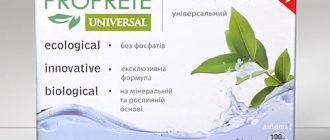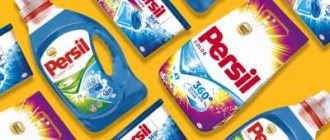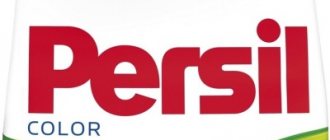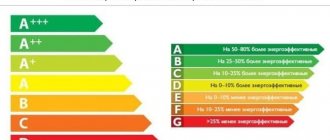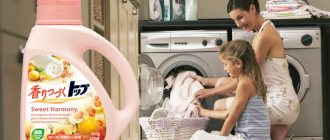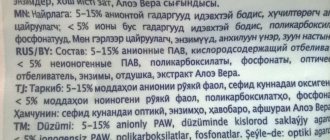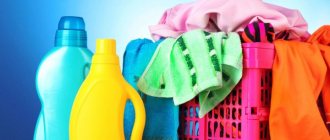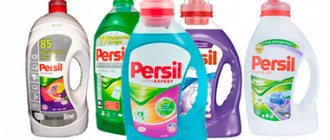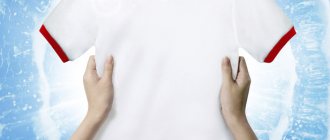Washing powders and liquid gels have become a part of our lives. It is impossible to imagine using a washing machine without them.
However, it is important not only to get clean, stain-free items. You must be sure that the detergent will not cause allergies in the person who will use the laundry. Even with the most thorough rinsing, microparticles of the powder will remain on bedding and clothing and will come into contact with the skin.
It is useful to know what these detergents are made of and why they wash better than soap. Inexpensive, effective formulations contain phosphates. They enhance the ability of the powder to wash clothes and soften the water. When purchasing such a product, you should know how phosphates affect the human body.
Are phosphates harmless?
Phosphates are salts of phosphoric acids. Initially, phosphates were used only as fertilizers to provide plants with the necessary amount of phosphorus.
However, a number of properties of phosphates turned out to be useful in everyday life. It is on their basis that inexpensive powders are produced that can efficiently wash dirty laundry. Treating clothing and bedding with phosphate compounds is very economical. When washing with such powders, you save water, electricity, and money for purchasing detergent.
Part of the popularity of products containing phosphates is determined by price. But on the other hand, such powders effectively remove dirt from laundry. They allow you to dissolve salts of fatty acids that are insoluble in water, prevent secondary contamination during washing, and prevent the formation of scale inside the washing machine. They are able to cope even with colored stains, breaking down the pigment inherent in the stain.
The effect of phosphates on the human body
Phosphorus is present in the body of every person. There is especially a lot of it in bones. Just like calcium, it is necessary for bone growth. It is involved in the process of protein formation, without it the functioning of the muscular system is impossible. However, excess phosphorus, as well as some of its forms, are the cause of many diseases.
Phosphates used in laundry detergents can cause dermatological problems. In addition to skin diseases, phosphates often cause dysfunction of the liver and kidneys, cause poisoning, which contributes to metabolic failure and exacerbation of chronic diseases. The use of powders containing phosphates leads to:
- destruction of skin fats, which reduces the protective properties of the skin;
- the appearance of a rash, the development of dermatitis;
- decreased immunity;
- disruption of the human reproductive system.
The harmful effects of phosphates on the body have led to the fact that in many countries their use in laundry detergents is prohibited. These include Belgium, Great Britain, Japan, Spain, Germany and some others. To avoid putting your health at risk, you can use phosphate-free washing powders or liquid detergents.
Flavors
Almost all washing powders contain fragrances. Flavors with natural ingredients often cause allergic and skin reactions.
Flavors identical to natural ones, as well as artificial ones, are produced chemically. Among them there can be both completely safe and those that can cause metabolic disorders and liver disease. There is evidence that some flavorings have carcinogenic properties.
If the washing powder has a strong smell, and things smell obsessively of fragrance after washing, it is better and safer to refuse such powder.
Phosphate-free washing powders
Having decided to protect yourself and your loved ones from the influence of harmful substances, you need to choose a powder without phosphates in order to use it in the future. Any detergent includes a number of components that remove dirt and determine the quality of the wash.
- The choice depends on the washing method. Some powders are designed for manual use and use in activator-type machines. Others are designed specifically for automatic washing machines.
- There are no phosphates and their analogues, phosphonates, in such powders. However, their composition necessarily contains surfactants - surfactants. They are necessary to dissolve dirt deposits and remove them from fabric fibers. Surfactants are components of a detergent that are harmful to humans, so it is necessary to ensure that the content of this component does not exceed certain standards.
- Phosphate-free powders contain zeolites. They are less dangerous to humans, but at high concentrations they can also cause harm to the body. Zeolites are a group of minerals that can remove contaminants through catalytic and sorption effects.
- When choosing phosphate-free detergents, you should make sure that the content of surfactants and zeolites in them is minimal. European standards require the presence of no more than 2% of so-called anionic surfactants in powder. In our country you can find detergents containing from 5 to 15% A-surfactants. Zeolites should be represented by silicates and carbonates; these are the least harmful of the minerals that make up the group. Their quantity should not exceed 1/3 of the powder by weight.
Children's
A child, especially a newborn, is very sensitive to the environment. The baby quickly develops allergies.
When taking care of the health of your baby, choose only time-tested or folk remedies without phosphates and other harmful compounds.
Rating of the best phosphate-free children's detergent compositions:
- Denis for children is praised by many mothers, but there are also many negative reviews. It has a good composition, does not cause allergic reactions and does not contain harmful substances. However, it is difficult to wash out of the dispenser. May be served in lumps. Denis is not good at removing old stains.
- Galinka is produced by the world famous company Procter & Gamble. They can wash both children's and adult clothes. It has a neutral odor, does not contain harmful substances, and prevents the formation of scale. Galinka contains 5–15% surfactants, and less than 5% nonionic surfactants, the rest of the composition is biological. It rinses well, children do not develop allergies, and it does its job despite its natural composition.
- Our mother is a good hypoallergenic product. Does not contain harmful synthetic additives, dyes or flavors. Our mother is suitable for hand and machine washing, you can soak your laundry in it. Not suitable for stubborn stains, rinses well.
- Amway baby is a concentrated product and lasts a long time. The products from this company are expensive, but they have been tested by pediatricians, allergists and dermatologists. Amway baby has a mild cleansing formula that is ideal for baby's skin and does not irritate. The product contains no phosphates or other harmful substances. It contains only safe components that are not harmful to a child, pregnant woman or adult.
- Stork has a toxicity index of 30%. Many people claim that this remedy is good. But some sellers have added it to the blacklist. The toxicity index of Stork exceeds the permissible values. He developed an unpleasant odor. Tests were carried out in the Russian Federation and protocols were drawn up, according to which the detergent cannot be used.
The choice should be approached responsibly. Read labels carefully and look for the ECO icon on the packaging. Give preference to a safe composition, so as not to later look for the cause of cancer, poisoning and other health problems. Study baby powders especially carefully, the baby’s health depends on it.
Do not use powders with phosphates, even if they remove old stains better. Remove stains by hand, using oxygen bleach and a homemade solution, and then wash with safe detergent.
Features of phosphate-free detergents
High-quality washing powders without phosphates do not form a large amount of foam. This is due to the limited surfactant content.
Phosphate-free powders require large amounts of water for washing. On average, 1 kilogram of laundry requires 5 liters. In this case, the amount of powder is 1 teaspoon. It is not worth increasing the dose, as the quality of the wash will decrease.
We recommend:
Which electric clothes dryer to choose for clothes
Phosphate-free detergents are relatively worse to rinse and wash less efficiently. Therefore, when choosing a powder, it is advisable to choose products from well-established manufacturers.
Chlorine
Chlorine is a very toxic gas. When washing with chlorinated powder, chlorine is released in the form of gas vapor and can cause severe poisoning. Especially in a small, unventilated room, such as a bathroom.
But even in small amounts, chlorine causes lung irritation. And with frequent use - destruction of lung tissue.
Chlorine in washing powder is very dangerous for people with pulmonary diseases, children and allergy sufferers. Knowing what dangers await us in a box of washing powder, we must take a very responsible approach to choosing a detergent.
Are there completely safe washing powders?
Rating of the best powders without phosphates and surfactants
Good baby powders contain natural sugar surfactants, soap, essential oils, citric acid, salt, soda and a number of additional substances that are not harmful to health. For use we can recommend:
- “Our Mama” is a Russian-made powder made from soap shavings, it does not contain dyes, flavors or synthetic additives.
- "Chistown" is a Russian-made product. Consists of natural soap, soda and citric acid. Designed for cotton, linen, viscose and synthetic fabrics. Requires additional rinsing.
- BioMio - produced in Russia and Denmark. Contains surfactants of plant origin, palm soap, cotton extract. The zeolite content does not exceed 15%.
- Sodasan Comfort is a German powder designed for people with sensitive skin, suitable for washing children's clothes. Contains soap based on vegetable oils, soda, and a number of other components. Cleans well without soaking.
- Amway baby is made in the USA, according to the manufacturer it is harmless to children. Positioned as biodegradable. Contains small amounts of phosphonates.
What is important to consider when choosing?
You can choose the right detergent for washing children's clothes, provided you follow some recommendations:
- It is important to make sure that the washing powder does not contain bleaches, fragrances, conditioners, or phosphates. If any of the listed components are declared by the manufacturer, then it is better to refuse such a product. It is necessary that there should be an o on the packaging, and if the product is intended for washing clothes of a child in the first months of life, then “for a newborn.”
- You can minimize the risks of buying falsified, counterfeit washing powder if you choose the product in specialized retail outlets (stores or children's goods departments of large supermarkets). The appropriate certificates, which the seller must provide upon the buyer’s request, will help you verify the quality of the product and its safety.
- When choosing powder for children's things, you need to pay attention to what age it is intended for. For infants, the manufacturer makes a special o on the packaging.
- When making a purchase, you need to make sure that the packaging is not damaged and there are no wet marks on the cardboard box. It’s good if the packaging is sealed and the manufacturer has provided the possibility of tightly closing an already opened container (for example, a zip fastener).
High-quality, safe phosphate-free washing powder for children's clothes cannot be cheap. When choosing a cheaper analogue of detergent, you should think carefully about the feasibility of such a purchase.
All the most important and useful information about children's washing powders is presented here.
Technological features of washing with phosphate-free powders
When switching to washing with modern phosphate-free powder, it is useful to clean the washing machine from the remnants of old products and scale using a special composition. The laundry also contains particles of old phosphate powders, so it is recommended to soak it for the first 2-5 washes before loading it into the machine.
When using the product, it is important to follow the manufacturer's recommendations for the amount of powder or gel. Too large a portion will lead to poor washing, as there will not be enough water in the product.
Rate this post
